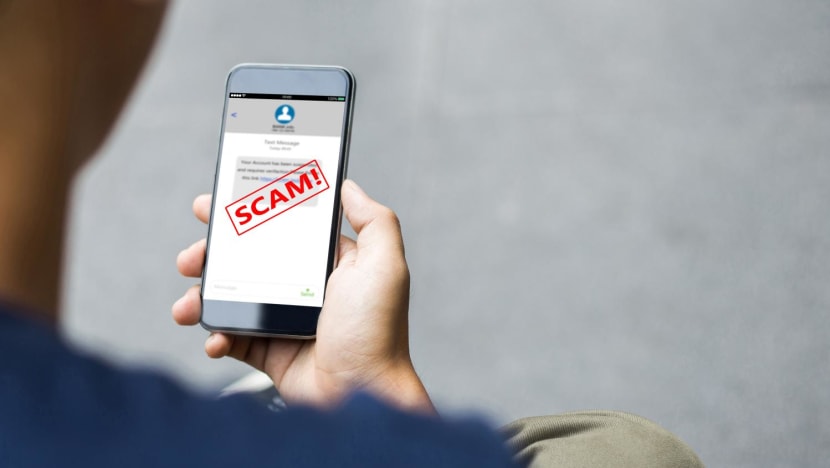New Bill to target online content suspected of use in scams, malicious cyber activity
The Online Criminal Harms Bill also aims to tackle distribution of child sexual abuse material and drug offences, among others.

File photo of a scam alert on a phone. (Photo: iStock)
SINGAPORE: A proposed law will allow the government to order the takedown of websites and online accounts suspected of being used for scams.
The new Bill, introduced in parliament on Monday (May 8), covers a range of criminal offences. But the threshold for taking action on one group of these offences - those relating to scams and malicious cyber activities - will be lower than the rest.
The Online Criminal Harms Bill tackles online content that is criminal in nature or used to abet crime, the Ministry of Home Affairs (MHA) said in a press release.
Some criminal offences it covers include those relating to:
- Terrorism and internal security
- Harmony between different races, religions or classes of population
- Incitement to violence
- Breaches of the Official Secrets Act
- Drugs
- Gambling
- Moneylending
- Scams and malicious cyber activities
- Sexual offences such as child abuse and voyeuristic material
Scam and cybercrime cases rose by more than a quarter to hit 33,669 last year, with scam victims cheated of a total of S$660.7 million (US$498.6 million).
MHA said that more needed to be done to fight against online criminal harms given the “pervasive threat and grave impact” on victims.
“Scams and malicious cyber activities that are propagated online can harm many people in a short time. Numerous websites, online accounts, and content are created every day to facilitate such crimes.”
MHA said such content appears benign at first glance and that syndicates “operate at industrial scale, and victims can fall prey within minutes of the launch of a scam campaign”.
The proposed Bill will allow the government to take “swift action” against online criminal activity and proactively disrupt scams before they harm more victims, it said.
This is on top of public education efforts and the engagement of private sector stakeholders like banks and telcos.
LOWER THRESHOLD FOR SUSPECTED SCAMS
If passed, the Bill will empower the government to issue directions to any online service through which criminal activities could be conducted.
They can be ordered to stop communicating specified online content, disable the content from being viewed, stop an account from communicating, block access to a web domain, and remove an app from an app store in respect of users in Singapore.
For example, to thwart loan scams, a government direction can be issued to block access to websites created by scam syndicates that appear to offer legitimate loan or financial consultancy services.
Recipients of government directions can be people and entities communicating the criminal content, online service providers, internet service providers and app stores.
“Government directions may be issued when there is reasonable suspicion that an online activity is being carried out to commit a crime,” said MHA.
For scams and malicious cyber activities, government directions can be issued “when it is suspected that any website, online account, or online activity may be used” for that purpose.
This lower threshold compared to the other specified criminal offences enables the government to disrupt scams and malicious cyber activities before anyone falls prey, said the ministry.
For instance, MHA said phishing scammers are known to register multiple website domains and upload phishing content to a web page minutes prior to launching their scam campaign.
A government direction can be issued to block access to the websites if there are reasons to believe these are “preparatory” to scam campaigns, even before any potential victims have visited them.
MHA added that the proposed Bill creates a framework under which the government can require designated online services to proactively disrupt scams and malicious cyber activities.
Details will be set out in the form of codes of practice issued by a designated authority from the Singapore Police Force.
The draft Online Criminal Harms Bill forms part of a suite of legislation that includes the Protection from Online Falsehoods and Manipulation Act (POFMA) and the Foreign Interference (Countermeasures) Act (FICA).
The government enacted POFMA in 2019 to counter misinformation and disinformation online, and FICA in 2021 to prevent foreign entities from using hostile information campaigns and local proxies to interfere in domestic politics.
Last year, parliament also passed amendments to the Broadcasting Act empowering the government to deal with harmful online content accessible in Singapore regardless of where the content is hosted or initiated.
Those amendments covered content advocating suicide or self-harm, physical or sexual violence and terrorism, content showing child sexual exploitation, content posing a public health risk, and content likely to cause racial and religious disharmony.
This article was originally published on CNA.

No comments
Share your thoughts! Tell us your name and class for a gift (: